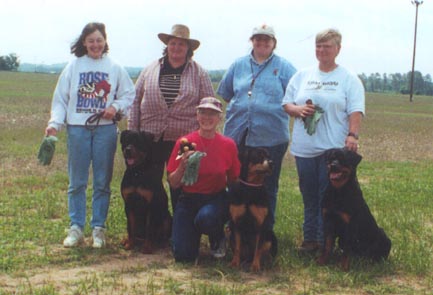[ Home ] [ Linus and Ember ] [ Ember's 'kids' ] [ More Family Additions ] [ Puppy Instructions ] [ Thinking of Breeding? ] [ How to Recognize a Reputable Breeder ] [ Belle's Tracking ]
Last updated: 12/24/2011
Tracking ..."Go Find" by Glenn Pollock
I was asked to write this article, about tracking, for the American Rottweiler Club website. It was also published by "The Canine Workshop" (July, 2001 issue). The handler, of the Rottweiler, is Donna Schiding, owner and trainer for Asgard's Fly Boy, CD, TD, TT, CGC, better known as "Boomer." The handler of the Lab, Emma, is Susan Douglas. Both have earned their AKC Tracking Dog (TD) titles. Emma has recently earned her TDX (Tracking Dog Excellent) title and Boomer and Donna are still hoping to get into a tracking test so that they may earn Boomer's TDX. Tracking trials have very limited entries (only about 1-5 dogs may be tested at any tracking test because of the area/space needed for the test and the time it takes to lay the tracks and run them), and it is difficult to get accepted into the trial. Both dogs are working towards their CDX titles as well. Good guides (books) for tracking must include Glenn Johnson's "The Tracking Dog." Follow his day-by-day schedule, and you and your dog will also be able to "go find."
TRACKING: "Go Find!"
by Glenn Pollock
|
|
Tracking is one of the most important and rewarding activities that you can share with your dog. If you enjoy the outdoors, nature and the company of your dog, you should enjoy tracking. Tracking allows the dog to be the guide, since we must follow them and allow them to decide the way. They alone have the power to find what we are unable to see. No one fully understands how a dog is able to follow a track, but I have been told that if a single drop of scent was hidden in the city of London, a dog would be able to sniff out that scent. When the 94 mile Alaskan Pipeline was built, all the available technology and equipment was unable to pinpoint the exact locations of the pipeline leaks. After all else failed, a team of three dogs with handlers were called in. Those three dogs and handlers were able to locate 150 confirmed leaks. One of those leaks was buried 18 feet below the clay surface, and another leak was 12 feet above the ground. |
|
Today we use our canine companion's noses to locate victims of earthquakes, lost children, lost property, to detect cancer, detect seizures, locate drugs and for numerous nosy tasks. The simple command, "Go find," will transport you and your dog to a new, stronger bond. You will learn to "trust your dog." I can not tell you how wonderful it feels when your dog (20 - 40 feet ahead of you, on the tracking line), puts its nose down, pulls into its tracking harness, and guides you on an unseen path directly to a single "lost" glove. The dog is the leader. The dog is allowed to do what nature intended, to sniff, to find and to share the prize with you. I hope that you and your canine companion will: "Go find." |
|
|
"Emma" (Emma Louise of Chestnut Hill, CD, TDX), attached to her 40 foot tracking line, leads Susan along a track. Emma and Susan earned their TDX on November 3, 2003. Susan and Emma are now training as a Search and Rescue Dog team. Search and Rescue teams have been used to locate missing children and adults, and many teams were used in Oklahoma City and in New York City are the World Trade Center disaster in September, 2001.
|
|
2001 ARC National TD qualifiers
(holding their green gloves) pose with their two tracking judges and
their newly title tracking dogs (TD). Dinky and I are in the center
|
 |